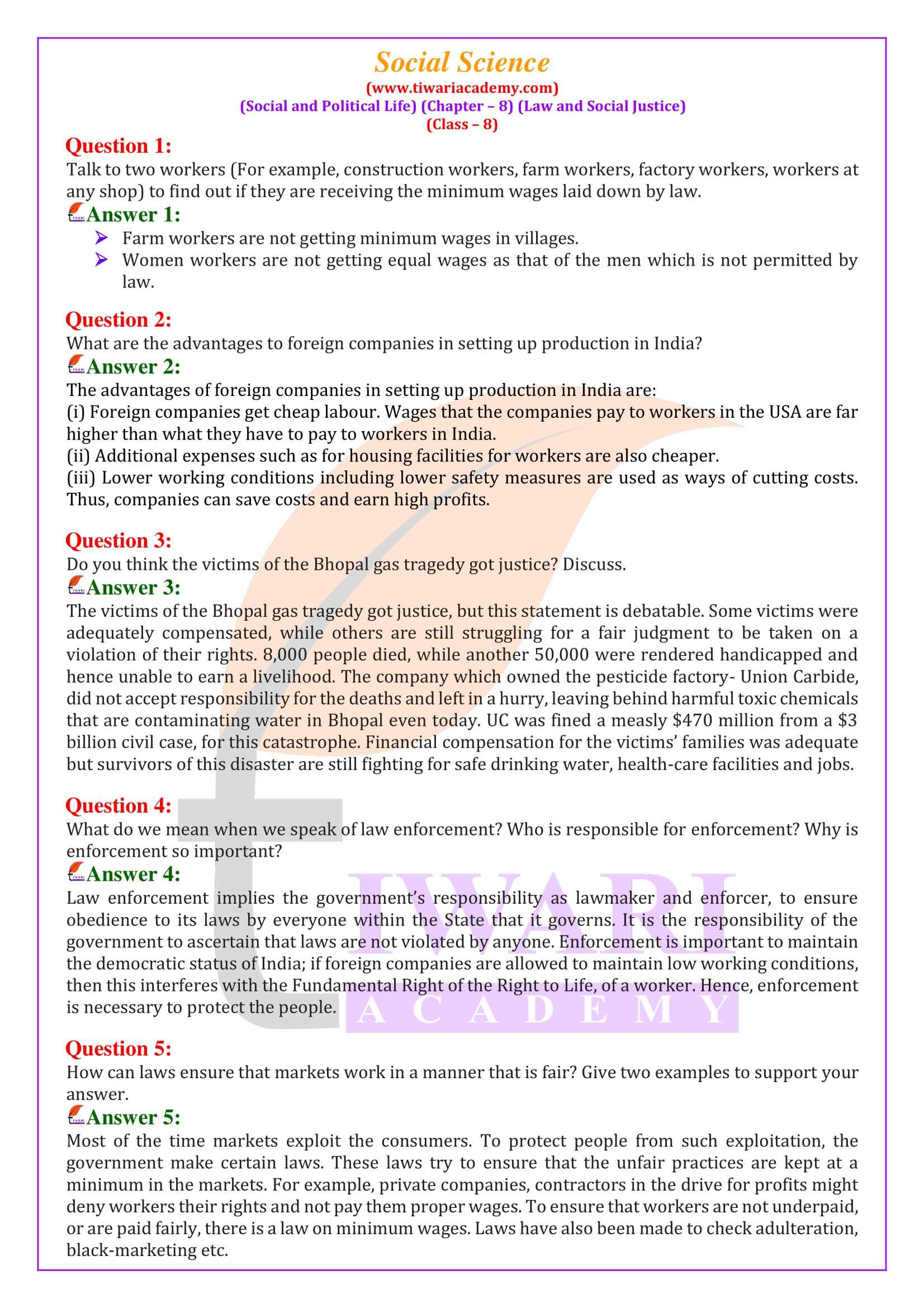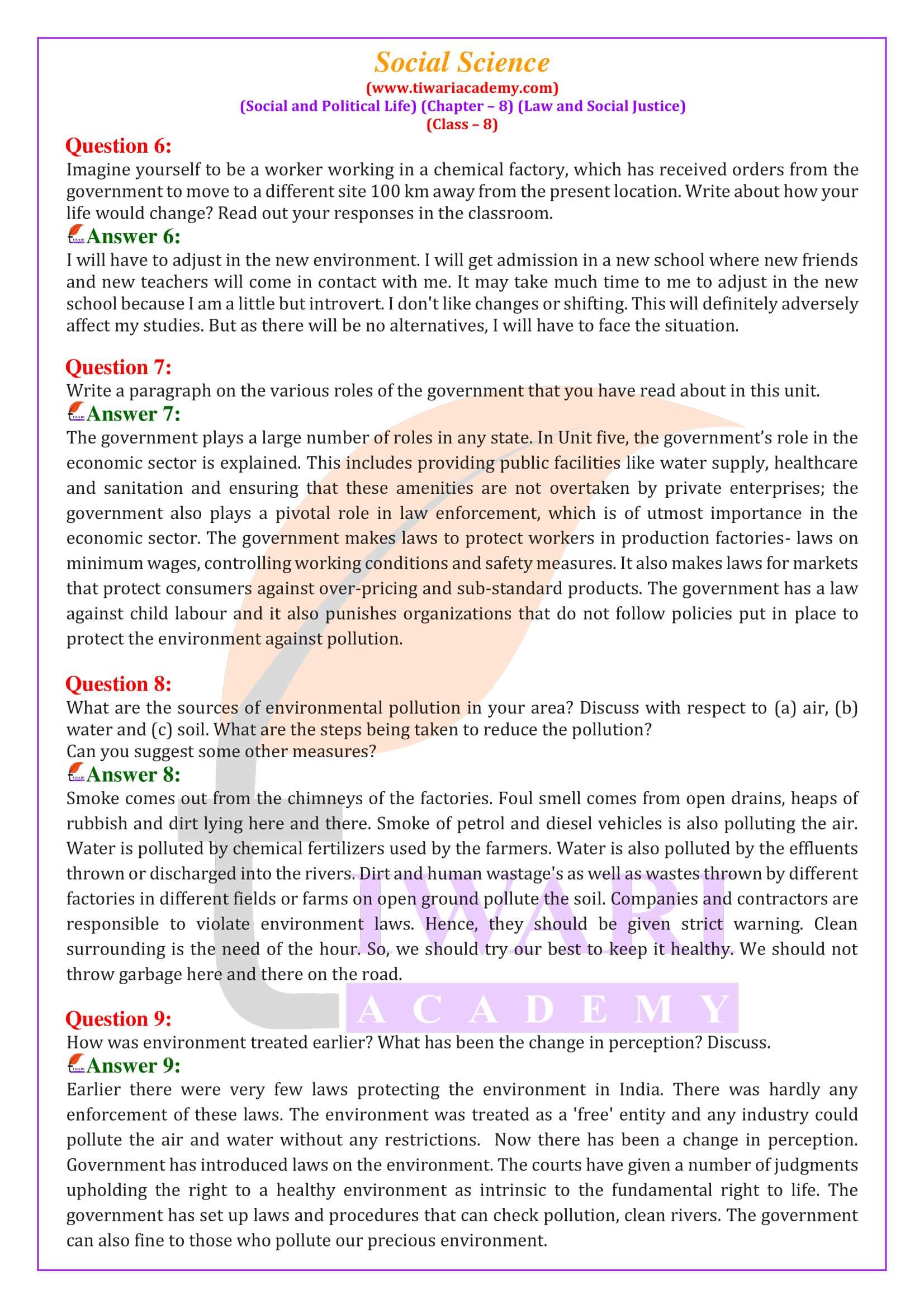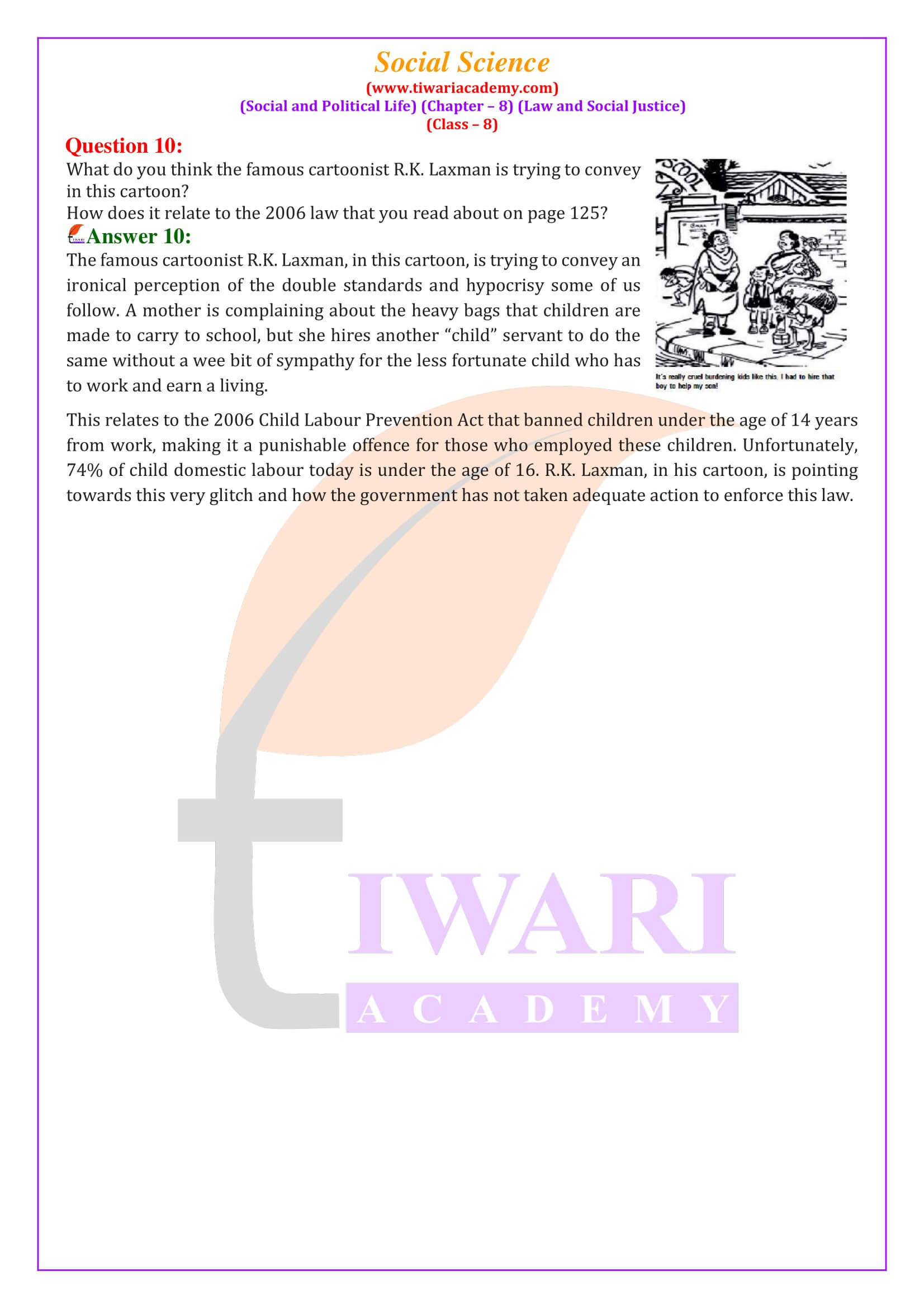NCERT Solutions for Class 8 Social Science Civics Chapter 8 Law and Social Justice in Hindi and English Medium (Unit 5 of Social and Political Life – III) updated for academic session 2025-26. Class 8 Political Science chapter 8 solutions are modified according to revised NCERT books published for upcoming 2025-26 exams.
NCERT Solutions for Class 8 Social Science Civics Chapter 8
| Class: 8 | Political Science |
| Subject: | Social Science – Civics |
| Chapter 8: | Law and Social Justice |
| Academic Year: | 2025-26 |
Extra Questions on 8th Civics Chapter 8
What is Child Labour Prevention Act?
According to the 2001 census, over 12 million children in India aged between 5 and 14 work in various occupations including hazardous ones. In October 2006, the government amended the Child Labour Prevention Act, banning children under 14 years of age from working as domestic servants or as workers in dhabas, restaurants, tea shops etc.
Why are most of the workers unsafe?
One worker can easily replace another. Since there is so much unemployment, there are many workers who are willing to work in unsafe conditions in return for a wage. Making use of the workers’ vulnerability, employers ignore safety in workplaces. Thus, even so many years after the Bhopal gas tragedy, there are regular reports of accidents in construction sites, mines or factories due to the callous attitude of the employers.
What is Worker’s unions?
An association of workers. Workers’ unions are common in factories and offices, but might be also found among other types of workers, say domestic workers’ unions. The leaders of the union bargain and negotiate with the employer on behalf of its members. The issues include wages, work rules, rules governing hiring, firing and promotion of workers, benefits and workplace safety.
Class 8 Civics Chapter 8 Question Answers
CBSE NCERT Solutions for Class 8 Social Science Civics Chapter 8 Law and Social Justice for session 2025-26. Download these solutions for offline use or use as it is without downloading online. Join the Discussion Forum to ask your doubts in Education and share your knowledge.
Important Questions on 8th Civics Chapter 8
Talk to two workers (For example, construction workers, farm workers, factory workers, workers at any shop) to find out if they are receiving the minimum wages laid down by law.
Farm workers are not getting minimum wages in villages. Women workers are not getting equal wages as that of the men which is not permitted by law.
What are the advantages to foreign companies in setting up production in India?
The advantages of foreign companies in setting up production in India are: (i) Foreign companies get cheap labour. Wages that the companies pay to workers in the USA are far higher than what they have to pay to workers in India. (ii) Additional expenses such as for housing facilities for workers are also cheaper. (iii) Lower working conditions including lower safety measures are used as ways of cutting costs. Thus, companies can save costs and earn high profits.
Do you think the victims of the Bhopal gas tragedy got justice? Discuss.
The victims of the Bhopal gas tragedy got justice, but this statement is debatable. Some victims were adequately compensated, while others are still struggling for a fair judgment to be taken on a violation of their rights. 8,000 people died, while another 50,000 were rendered handicapped and hence unable to earn a livelihood. The company which owned the pesticide factory- Union Carbide, did not accept responsibility for the deaths and left in a hurry, leaving behind harmful toxic chemicals that are contaminating water in Bhopal even today. UC was fined a measly $470 million from a $3 billion civil case, for this catastrophe. Financial compensation for the victims’ families was adequate but survivors of this disaster are still fighting for safe drinking water, health-care facilities and jobs.
What do we mean when we speak of law enforcement? Who is responsible for enforcement? Why is enforcement so important?
Law enforcement implies the government’s responsibility as lawmaker and enforcer, to ensure obedience to its laws by everyone within the State that it governs. It is the responsibility of the government to ascertain that laws are not violated by anyone. Enforcement is important to maintain the democratic status of India; if foreign companies are allowed to maintain low working conditions, then this interferes with the Fundamental Right of the Right to Life, of a worker. Hence, enforcement is necessary to protect the people.
How can laws ensure that markets work in a manner that is fair? Give two examples to support your answer.
Most of the time markets exploit the consumers. To protect people from such exploitation, the government make certain laws. These laws try to ensure that the unfair practices are kept at a minimum in the markets. For example, private companies, contractors in the drive for profits might deny workers their rights and not pay them proper wages. To ensure that workers are not underpaid, or are paid fairly, there is a law on minimum wages. Laws have also been made to check adulteration, black-marketing etc.
Imagine yourself to be a worker working in a chemical factory, which has received orders from the government to move to a different site 100 km away from the present location. Write about how your life would change? Read out your responses in the classroom.
I will have to adjust in the new environment. I will get admission in a new school where new friends and new teachers will come in contact with me. It may take much time to me to adjust in the new school because I am a little but introvert. I don’t like changes or shifting. This will definitely adversely affect my studies. But as there will be no alternatives, I will have to face the situation.
Write a paragraph on the various roles of the government that you have read about in this unit.
The government plays a large number of roles in any state. In Unit five, the government’s role in the economic sector is explained. This includes providing public facilities like water supply, healthcare and sanitation and ensuring that these amenities are not overtaken by private enterprises; the government also plays a pivotal role in law enforcement, which is of utmost importance in the economic sector. The government makes laws to protect workers in production factories- laws on minimum wages, controlling working conditions and safety measures. It also makes laws for markets that protect consumers against over-pricing and sub-standard products. The government has a law against child labour and it also punishes organizations that do not follow policies put in place to protect the environment against pollution.
What are the sources of environmental pollution in your area? Discuss with respect to (a) air, (b) water and (c) soil. What are the steps being taken to reduce the pollution? Can you suggest some other measures?
Smoke comes out from the chimneys of the factories. Foul smell comes from open drains, heaps of rubbish and dirt lying here and there. Smoke of petrol and diesel vehicles is also polluting the air. Water is polluted by chemical fertilizers used by the farmers. Water is also polluted by the effluents thrown or discharged into the rivers. Dirt and human wastage’s as well as wastes thrown by different factories in different fields or farms on open ground pollute the soil. Companies and contractors are responsible to violate environment laws. Hence, they should be given strict warning. Clean surrounding is the need of the hour. So, we should try our best to keep it healthy. We should not throw garbage here and there on the road.
How was environment treated earlier? What has been the change in perception? Discuss.
Earlier there were very few laws protecting the environment in India. There was hardly any enforcement of these laws. The environment was treated as a ‘free’ entity and any industry could pollute the air and water without any restrictions. Now there has been a change in perception. Government has introduced laws on the environment. The courts have given a number of judgments upholding the right to a healthy environment as intrinsic to the fundamental right to life. The government has set up laws and procedures that can check pollution, clean rivers. The government can also fine to those who pollute our precious environment.
Important Notes on 8th Civics Chapter 8
People pollute our resources:
In 1984, there were very few laws protecting the environment in India, and the there was hardly any enforcement of these laws. The environment was treated as a ‘free’ entity and any industry could pollute the air and water without any restrictions.
Whether it was our rivers, air and groundwater – the environment was being polluted and the health of people disregarded.






